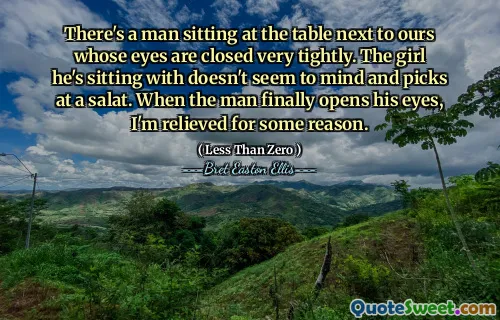Where are we going? I asked I don't know, he said. Just driving. But this road doesn't go anywhere, I told him. That doesn't matter. What does? I asked, after a little while. Just that we're on it, dude, he said.
In the exchange between the two characters in Bret Easton Ellis's "Less Than Zero," a sense of aimlessness is conveyed through their conversation about driving without a destination. One character expresses a concern that the road they are on seems pointless, indicating a lack of direction in their lives. This reflects a broader theme of disconnection and existential uncertainty present in the novel.
The other character, however, dismisses the need for a destination, suggesting that the act of simply being on the road matters more than where it leads. This highlights a focus on the journey itself rather than the end goal, emphasizing a carefree attitude towards life despite its inherent lack of purpose.






